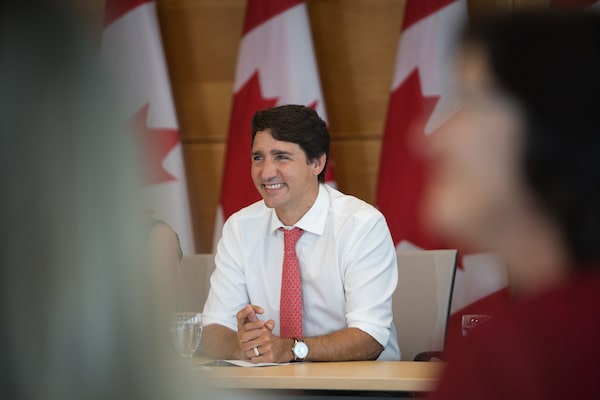
Justin Trudeau said that the allegations in the Globe story were false.RILEY SMITH/The Canadian Press
On three occasions, Justin Trudeau or people around him made statements that the Ethics Commissioner’s report shows were untrue. It is remarkable that a prime minister and his most trusted advisers would make statements that were not borne out by the facts.
The first mistruth, if you want to call it that, occurred Feb. 7, the day The Globe and Mail first broke the story stating that the Prime Minister’s Office “attempted to press Jody Wilson-Raybould when she was justice minister to intervene in the corruption and fraud prosecution" of SNC-Lavalin.
Mr. Trudeau wasted no time. That same day he told reporters: “The allegations in the Globe story this morning are false.”
Neither Ms. Wilson-Raybould or her successor, David Lametti, “was ever directed by me or by anyone in my office to take a decision in this matter,” Mr. Trudeau insisted.
The Globe story never said “directed.” It said “pressed.” But that’s not the main point. Ethics Commissioner Mario Dion in his report this week found that “Mr. Trudeau used his position of authority over Ms. Wilson-Raybould to seek to influence, both directly and indirectly, her decision" on whether to overrule the Director of Public Prosecutions and grant the Canadian engineering firm a reprieve.
The allegations in the Globe story were true, and the Prime Minister knew it.
The second thing that turned out not to be so involved the testimony of Michael Wernick, then clerk of the Privy Council, before the Commons justice committee in February.
Mr. Wernick insisted that any advocacy on behalf of the Quebec-based firm that he, the Prime Minister or any officials undertook was entirely within bounds.
“We are discussing lawful advocacy that the minister take a lawful decision which in the end she did not take,” he told the committee.
In every conversation he or others had with Ms. Wilson-Raybould on SNC-Lavalin, “I can tell you my view, very firmly, is that they were entirely appropriate, lawful, legal," he added. "I’m prepared to submit to the judgment of the Ethics Commissioner on that.”
The judgment of the Ethics Commissioner was that “the authority of the Prime Minister and his office was used to circumvent, undermine and ultimately attempt to discredit the decision of the Director of Public Prosecutions as well as the authority of Ms. Wilson-Raybould.” So there.
The third thing that turned out to be less than candid is still ongoing. In March, Mr. Trudeau stated that the government had released Ms. Wilson-Raybould from her oath of solicitor-client privilege so that she could tell the justice committee her version of events.
“What we have done as a government is grant an unprecedented waiver so that a full airing could happen at the justice committee," Mr. Trudeau declared in March.
Ms. Wilson-Raybould said there was more she needed to say, but she was bound by an oath to respect cabinet confidences that had not been waived.
But Mr. Trudeau was and is not prepared to allow her or others to speak.
“Nine witnesses informed our Office that they had information they believed to be relevant, but that could not be disclosed because, according to them, this information would reveal a confidence,” Mr. Dion wrote in his report. But his repeated appeals to allow the witnesses to testify were rebuffed by the Prime Minister and his advisers.
As a result, neither Mr. Dion nor anyone else on the outside fully knows what went down, especially during the cabinet shuffle that saw Ms. Wilson-Raybould removed as attorney-general.
“If our Office is to remain truly independent and fulfill its purpose, I must have unfettered access to all information that could be relevant to the exercise of my mandate,” Mr. Dion wrote in protest. “I must be satisfied that decisions made by the most senior public office holders, including those discussed at cabinet, are free from any conflicts of interest.” So much for the PM’s promise of “a full airing.”
Three times the Prime Minister or those around him insisted something was so. Three times it turned out not to be so. And those are the facts.
Our Morning Update and Evening Update newsletters are written by Globe editors, giving you a concise summary of the day’s most important headlines. Sign up today.